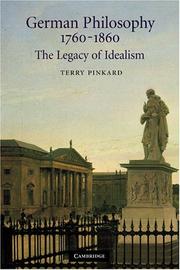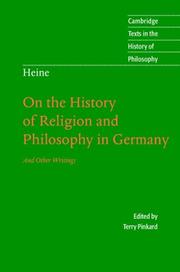| Listing 1 - 6 of 6 |
Sort by
|

ISBN: 1107128536 1282389300 0511643136 9786612389306 051180184X 0511202601 051107767X 0511556411 051107610X 9780511077678 9780511076107 9780511801846 0521663261 9780521663267 0521663814 9780521663816 9781107128538 9781282389304 9780511643132 6612389303 9780511202605 9780511556418 Year: 2002 Publisher: Cambridge Cambridge University Press
Abstract | Keywords | Export | Availability | Bookmark
 Loading...
Loading...Choose an application
- Reference Manager
- EndNote
- RefWorks (Direct export to RefWorks)
In the second half of the eighteenth century, German philosophy came for a while to dominate European philosophy. It changed the way in which not only Europeans, but people all over the world, conceived of themselves and thought about nature, religion, human history, politics, and the structure of the human mind. In this rich and wide-ranging book, Terry Pinkard interweaves the story of 'Germany' - changing during this period from a loose collection of principalities into a newly-emerged nation with a distinctive culture - with an examination of the currents and complexities of its developing philosophical thought. He examines the dominant influence of Kant, with his revolutionary emphasis on 'self-determination', and traces this influence through the development of romanticism and idealism to the critiques of post-Kantian thinkers such as Schopenhauer and Kierkegaard. His book will interest a range of readers in the history of philosophy, cultural history and the history of ideas.
Philosophy, German --- 141.13 --- 141.13 Metafysisch idealisme --- Metafysisch idealisme --- History of philosophy --- anno 1700-1799 --- anno 1800-1899 --- Germany --- Philosophy [German ] --- 18th century --- 19th century --- Arts and Humanities --- Philosophy
Book
ISBN: 9780521855792 9781139050494 1108660290 1108617484 1139050494 0521855799 1108730086 Year: 2018 Publisher: Cambridge, England : Cambridge University Press,
Abstract | Keywords | Export | Availability | Bookmark
 Loading...
Loading...Choose an application
- Reference Manager
- EndNote
- RefWorks (Direct export to RefWorks)
Hegel's Phenomenology of Spirit (1807) is one of the most influential texts in the history of modern philosophy. In it, Hegel proposed an arresting and novel picture of the relation of mind to world and of people to each other. Like Kant before him, Hegel offered up a systematic account of the nature of knowledge, the influence of society and history on claims to knowledge, and the social character of human agency itself. A bold new understanding of what, after Hegel, came to be called 'subjectivity' arose from this work, and it was instrumental in the formation of later philosophies, such as existentialism, Marxism, and American pragmatism, each of which reacted to Hegel's radical claims in different ways. This edition offers a new translation, an introduction, and glossaries to assist readers' understanding of this central text, and will be essential for scholars and students of Hegel.
Spirit --- Consciousness --- Truth --- Conviction --- Belief and doubt --- Philosophy --- Skepticism --- Certainty --- Necessity (Philosophy) --- Pragmatism --- Apperception --- Mind and body --- Perception --- Psychology --- Self --- Pneuma --- Pneumatology (Philosophy) --- Pneumatology (Theology) --- Holy Spirit --- Soul --- Hegel, Georg Wilhelm Friedrich, --- Spirit. --- Consciousness. --- Truth.
Book
ISBN: 9780226813240 Year: 2022 Publisher: Chicago University of Chicago press
Abstract | Keywords | Export | Availability | Bookmark
 Loading...
Loading...Choose an application
- Reference Manager
- EndNote
- RefWorks (Direct export to RefWorks)
"In Practice, Power, and Forms of Life, philosopher Terry Pinkard interprets Sartre's late work as a fundamental reworking of his earlier work, especially in terms of his understanding of the possibility of communal action as genuinely free, which the French philosopher had previously argued was impossible. Pinkard shows how Sartre figured in contemporary debates about the use of the first-person and how this informed his theory of action. Pinkard reveals how Sartre was led back to Hegel, which itself was spurred on by his newfound interest in Marxism in the 1950s. Pinkard also argues that Sartre took up Heidegger's critique of existentialism, developing a new post-Marxist theory of the way actors exhibit the class relations of their form of life in their actions, and showing how genuine freedom is present only in certain types of "we" relationships. Pinkard argues that Sartre constructed a novel position on freedom that has yet to be adequately taken up and thought through in philosophy and political theory. Through Sartre, Pinkard advances an argument that contributes to the history of philosophy as well as contemporary and future debates on action and freedom"--
Sartre, Jean-Paul, --- Marx, Karl, --- Hegel, Georg Wilhelm Friedrich,
Book
ISBN: 9780197663134 9780197663127 Year: 2023 Publisher: New York, NY : Oxford University Press,
Abstract | Keywords | Export | Availability | Bookmark
 Loading...
Loading...Choose an application
- Reference Manager
- EndNote
- RefWorks (Direct export to RefWorks)
"Hegel begins the book by stating why prefaces to this kind of work cannot really be written. The reason is that in this kind of book, there can be no preannounced lesson to be learned, and the idea is that whatever it is that one learns, one has to learn it for oneself in going through the model cases laid out in the book. He says that in fact everything hangs on apprehending and expressing the true not merely as substance but also equally as subject. That "subject" is said to be "pure negativity," which estranges itself and then restores itself. As it moves in that field of estrangement and restoration, it comes to understand that the true (what it seeks) is the whole and that it only comes into view as a result of what the book investigates"--
Digital
ISBN: 9781139050494 Year: 2018 Publisher: Cambridge Cambridge University Press
Abstract | Keywords | Export | Availability | Bookmark
 Loading...
Loading...Choose an application
- Reference Manager
- EndNote
- RefWorks (Direct export to RefWorks)
Cognitive psychology --- Theory of knowledge --- Hegel, Georg W.F.

ISBN: 0511808046 0521861292 0521678501 Year: 2007 Publisher: Cambridge : Cambridge University Press,
Abstract | Keywords | Export | Availability | Bookmark
 Loading...
Loading...Choose an application
- Reference Manager
- EndNote
- RefWorks (Direct export to RefWorks)
This volume presents a colourful and entertaining overview of German intellectual history by a central figure in its development. Heinrich Heine (1797-1856), famous poet, journalist, and political exile, studied with Hegel and was personally acquainted with the leading figures of the most important generation of German writers and philosophers. In his groundbreaking History he discusses the history of religion, philosophy, and literature in Germany up to his time, seen through his own highly opinionated, politically aware, philosophically astute, and always ironic perspective. This work, and other writings focussing especially on Heine's rethinking of Hegel's philosophy, are presented here in a new translation by Howard Pollack-Milgate. The volume also includes an introduction by Terry Pinkard which examines Heine both in relation to Hegel and Nietzsche and as a thinker in his own right.
Philosophy, German. --- German philosophy --- Hegel, Georg Wilhelm Friedrich, --- Hegel, Giorgio Guglielmo Frederico --- Hegel, Georg Wilhelm Friedrich --- Influence. --- Germany --- Religion. --- Hēgeru, --- Hei-ko-erh, --- Gegelʹ, Georg, --- Hījil, --- Khegel, --- Hegel, G. W. F. --- Hegel, --- Hei Ge Er, --- Chenkel, --- Hīghil, --- הגל, --- הגל, גאורג וילהלם פרידריך, --- הגל, גיאורג וילהלם פרידריך, --- הגל, ג.ו.פ, --- היגל, גורג ווילהלם פרדריך, --- היגל, גיורג וילהלם פרידריך, --- 黑格尔, --- Hegel, Guillermo Federico, --- Hegel, Jorge Guillermo Federico, --- Heyel, Georg Wilhelm Friedrich, --- Higil, Gʼūrg Vīlhim Frīdrīsh, --- هگل, --- هگل، گئورگ ويلهم فريدريش, --- Arts and Humanities --- Philosophy
| Listing 1 - 6 of 6 |
Sort by
|

 Search
Search Feedback
Feedback About UniCat
About UniCat  Help
Help News
News